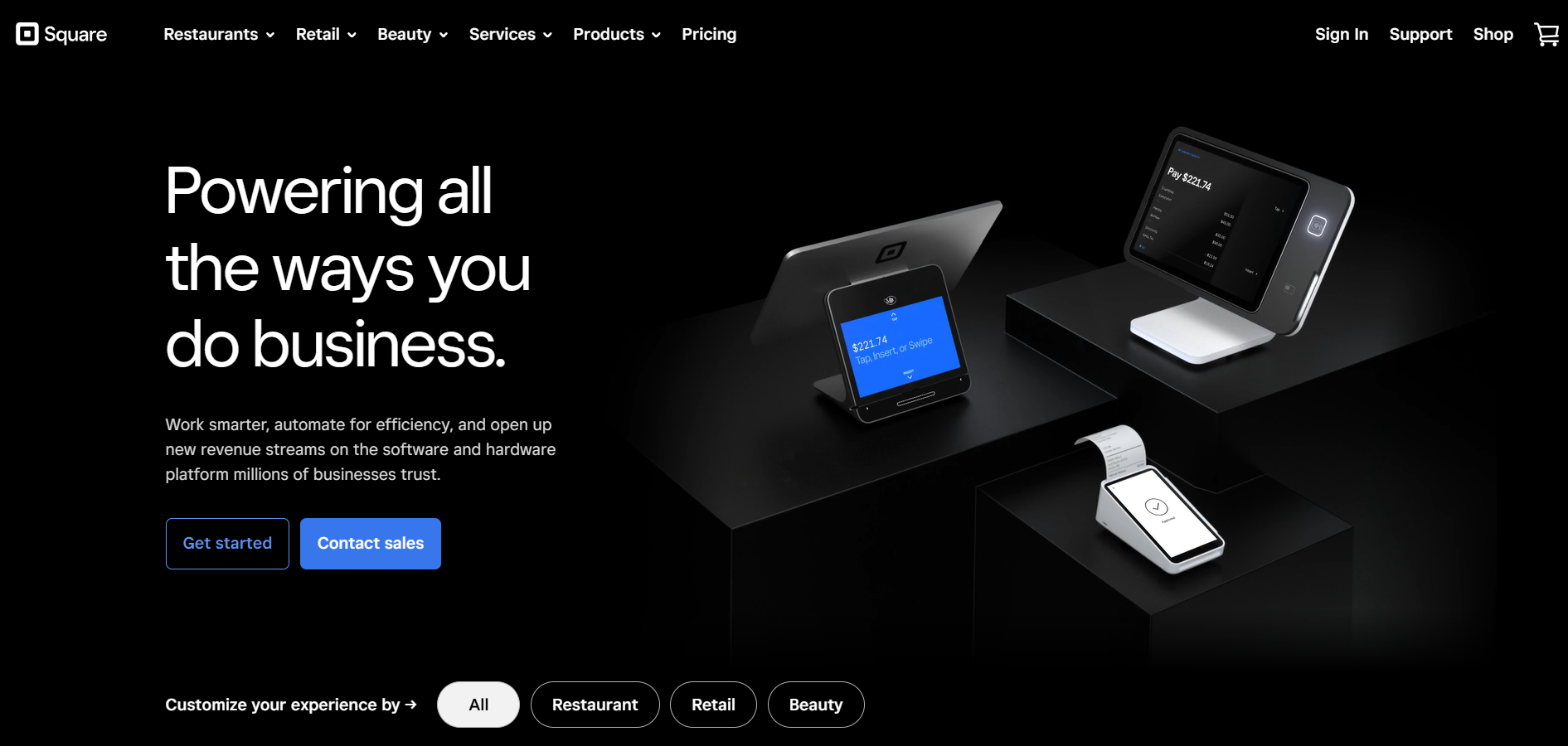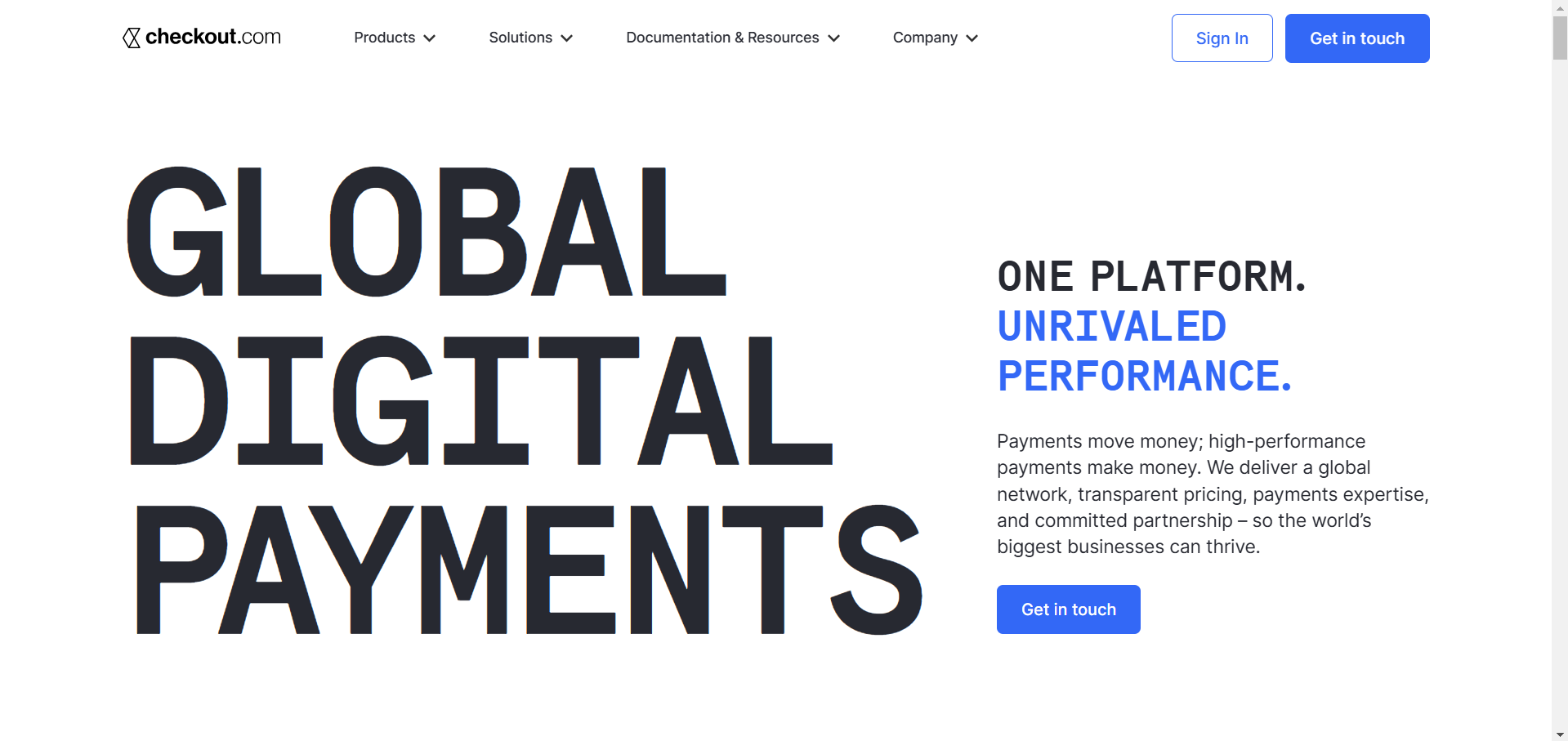Best Stripe Alternatives That You Should Know About
Written by: Hrishikesh Pardeshi, Founder at Flexiple, buildd & Remote Tools.
Last updated: Nov 08, 2024
Best Stripe Alternatives are:
PayPal
Razorpay
Adyen
Square
Checkout.com
Selecting the right payment processing platform is essential for businesses to ensure smooth and secure financial transactions. While Stripe has become a go-to solution for many, it may not cater to every business's unique requirements. Factors such as pricing, supported payment methods, ease of integration, and customer support can influence the decision to seek alternatives.
If you're exploring payment processing solutions beyond Stripe, these alternatives offer a variety of features tailored to different business needs. Whether you require international payment support, advanced fraud protection, or seamless integration with your existing systems, these platforms provide unique strengths to enhance your financial transactions. From PayPal's widespread recognition to Adyen's robust enterprise solutions, each alternative presents distinct advantages suited for diverse business environments.
Table of Contents
Why You Need Alternatives to Stripe?
While Stripe is a leading credit card processing platform renowned for its developer-friendly APIs and comprehensive features, it may not be the ideal fit for every business. Various factors such as monthly fee structures, supported payment methods, customer support, and regional availability can influence the effectiveness of a credit card payments processor for your specific needs. Exploring alternatives to Stripe can help you identify solutions that better align with your business model, target market, and operational requirements. Whether you're a small startup, a growing e-commerce store, or a large enterprise, considering other options ensures you choose a credit card processing provider that offers the best value, manageable credit card processing fees, and functionality to accept payments for your unique situation.
Who Should Consider Using Stripe Alternatives?
You should consider using Stripe alternatives if you're seeking different features, pricing models, or user experiences. Here's a look at who might benefit from these alternatives and why:
Small to Medium-Sized Businesses
For businesses that require straightforward payment processing without the complexity of extensive APIs, alternatives like PayPal and Square offer user-friendly interfaces and easy setup processes. These platforms provide essential payment features that cater to businesses looking for reliable and hassle-free solutions.
International Businesses
Businesses operating in multiple countries or dealing with international customers might find Stripe's regional limitations restrictive. Alternatives like Adyen and Checkout.com support a wider range of currencies and payment methods, making them more suitable for companies with a global presence.
High-Volume Merchants
For merchants processing a large volume of transactions, finding a payment processor with scalable solutions and competitive transaction fees is crucial. Platforms like Adyen and Razorpay offer robust infrastructure and pricing models that can handle high transaction volumes efficiently.
Businesses Needing Specialized Features
Some businesses may require specific features such as advanced fraud protection, subscription management, or seamless integration with particular platforms. Alternatives like Razorpay and Checkout.com provide specialized tools and integrations that cater to these unique requirements.
Startups and Developers
Startups and developers who need flexible and customizable payment solutions might find Stripe's extensive APIs beneficial. However, if Stripe's pricing or features don't align with their needs, alternatives like PayPal and Square offer different levels of customization and integration capabilities that might be more appropriate.
Stripe Alternatives Comparison Table
Feature
PayPal
Razorpay
Adyen
Square
Checkout.com
Ease of Use
Very Easy
Easy
Moderate
Very Easy
Easy
Pricing
Free & Paid Plans
Free & Paid Plans
Custom Pricing
Free & Paid Plans
Custom Pricing
Platform Support
Web, iOS, Android
Web, iOS, Android
Web, iOS, Android
Web, iOS, Android
Web, iOS, Android
Collaboration Features
Limited
Moderate
Extensive
Moderate
Extensive
Transaction Tools
Advanced
Advanced
Advanced
Intermediate
Advanced
Best Stripe Alternatives
If you're in search of reliable online payment processing solutions, exploring the best Stripe alternatives can help you find the right fit. While Stripe is a popular choice to accept online payments and handle recurring billing, other platforms offer unique benefits, such as lower fees, broader international support, or specialized features for merchant account(s). Whether you’re a small business owner looking to process payments, a developer, or a large enterprise, these alternatives can provide tailored tools to streamline your financial transactions and accept credit card payments efficiently. Here’s a look at some of the top Stripe alternatives to consider for your payment processing needs.
PayPal

PayPal is one of the most widely recognized and trusted payment processing platforms globally. It offers a comprehensive suite of tools for businesses of all sizes, enabling seamless transactions both online and in-person. With its extensive reach and robust security features, PayPal remains a top choice for businesses looking to manage their payments efficiently.
PayPal vs Stripe
PayPal and Stripe are both leading payment processors, but they cater to slightly different needs. PayPal is renowned for its ease of use and widespread consumer trust, making it an excellent choice for businesses that prioritize customer familiarity and straightforward transaction processes. Stripe, on the other hand, is favored by developers for its customizable APIs and advanced integration capabilities. While Stripe offers more flexibility in terms of payment processing and customization, PayPal provides a more out-of-the-box solution with extensive merchant support and a large user base.
Key Features of PayPal
Global Reach: Supports transactions in over 200 countries and 25 currencies.
Variety of Payment Methods: Accepts credit and debit cards, PayPal balances, and alternative payment methods.
Invoicing and Billing: Offers tools for creating and managing invoices.
Mobile Payments: Provides robust mobile payment solutions for both online and in-person transactions.
Security and Fraud Protection: Advanced security features, including fraud detection and buyer protection.
PayPal Pros
Widespread Recognition: Trusted by millions of users worldwide, enhancing customer confidence.
Ease of Setup: Simple to integrate and start accepting payments quickly.
Flexible Payment Options: Supports a wide range of payment methods, catering to diverse customer preferences.
Comprehensive Support: Offers extensive resources and customer support options.
Recurring Payments: Facilitates subscription-based billing and recurring payments.
PayPal Cons
Higher Transaction Fees: Fees can be higher compared to some other payment processors, especially for international transactions.
Account Holds and Freezes: Reports of occasional account holds, which can disrupt business operations.
Limited Customization: Less flexibility in terms of payment page customization compared to Stripe.
Customer Service Issues: Some users report challenges with PayPal’s customer service responsiveness.
Currency Conversion Fees: Additional fees for currency conversions, which can add to overall costs.
PayPal Pricing
PayPal offers a transparent pricing structure with no monthly fees for basic services. Transaction fees typically include a percentage of the transaction amount plus a fixed fee, which varies based on the country and currency. For international transactions, additional fees apply for currency conversions. PayPal also offers premium services and business solutions with customized pricing based on the specific needs and volume of transactions.
Razorpay

Razorpay is a leading payment gateway in India, renowned for its seamless integration and comprehensive suite of payment solutions tailored to the Indian market. It offers a range of services that cater to both small businesses and large enterprises, providing flexibility and scalability to meet diverse payment processing needs.
Razorpay vs Stripe
While Stripe is a global payment processor with a strong presence in multiple countries, Razorpay primarily focuses on the Indian market. Razorpay offers localized payment options, such as UPI and regional payment methods, which are essential for businesses operating in India. Additionally, Razorpay provides extensive support for Indian compliance and regulatory requirements, making it a preferred choice for businesses targeting Indian customers. Stripe, conversely, offers broader international support but may lack some of the localized features that Razorpay provides for the Indian market.
Key Features of Razorpay
Local Payment Methods: Supports UPI, Netbanking, Wallets, and regional payment options.
Subscription Management: Facilitates recurring payments and subscription billing.
Invoicing and Billing: Tools for creating and managing invoices tailored to the Indian market.
Security and Compliance: PCI DSS compliant with robust security measures.
Developer-Friendly APIs: Easy integration with customizable APIs for tailored payment solutions.
Razorpay Pros
Localized Solutions: Offers payment methods and features tailored specifically for the Indian market.
Competitive Pricing: Transparent and competitive transaction fees, especially for domestic transactions.
Comprehensive Dashboard: User-friendly dashboard for managing transactions, refunds, and analytics.
Customer Support: Dedicated support for businesses, ensuring timely assistance.
Advanced Fraud Detection: Implements robust fraud prevention measures to protect transactions.
Razorpay Cons
Limited International Support: Primarily focused on the Indian market, with limited support for international transactions.
Customization Constraints: While offering developer-friendly APIs, some users may find customization options less extensive compared to Stripe.
Settlement Times: Settlement times may vary, potentially affecting cash flow for some businesses.
Integration Complexity: Advanced features may require more technical expertise to implement effectively.
Feature Gaps: Some advanced features available in global competitors may be missing or less developed.
Razorpay Pricing
Razorpay offers a straightforward pricing model with no setup or maintenance fees. Transaction fees are competitive, particularly for domestic transactions within India. For international transactions, fees are slightly higher to account for currency conversion and cross-border processing. Razorpay also provides customized pricing for large enterprises and high-volume merchants, ensuring that businesses can find a plan that suits their specific needs.
Adyen

Adyen is a global payment processing platform known for its robust and scalable solutions tailored to enterprise-level businesses. It provides a unified platform that supports a wide range of payment methods, currencies, and channels, making it an ideal choice for businesses with international operations and complex payment requirements.
Adyen vs Stripe
Adyen and Stripe both cater to businesses looking for comprehensive payment processing solutions, but Adyen is often preferred by larger enterprises due to its extensive global reach and advanced features. Adyen offers a unified commerce platform that integrates online, in-store, and mobile payments, providing a seamless payment experience across all channels. Stripe, while also offering robust APIs and developer-friendly tools, may be more suited to businesses that require highly customizable payment solutions with a focus on online transactions. Adyen’s enterprise-grade features and dedicated support make it a strong contender for large-scale businesses with diverse payment needs.
Key Features of Adyen
Global Payment Support: Accepts payments from over 200 countries and in multiple currencies.
Unified Commerce: Integrates online, in-store, and mobile payment processing into a single platform.
Advanced Reporting and Analytics: Provides detailed insights and analytics for transaction data.
Risk Management: Comprehensive fraud detection and risk management tools.
Customizable Checkout: Flexible and customizable checkout experiences tailored to business needs.
Adyen Pros
Scalable Solutions: Designed to handle high transaction volumes, making it suitable for large enterprises.
Extensive Payment Method Support: Supports a wide array of global and local payment methods.
Unified Platform: Streamlines payment processing across multiple channels, enhancing operational efficiency.
Advanced Security Features: Implements enterprise-grade security measures to protect transactions.
Dedicated Support: Offers personalized support and account management for businesses.
Adyen Cons
Complex Pricing Structure: Pricing can be intricate and may require detailed negotiation, especially for large enterprises.
Longer Setup Time: Implementing Adyen’s comprehensive solutions can take more time compared to simpler payment processors.
Less Suitable for Small Businesses: The platform is geared more towards larger businesses, potentially making it less ideal for small startups.
Limited Customization for Small-Scale Use: Smaller businesses may find the platform’s extensive features overwhelming or unnecessary.
High Minimum Requirements: Adyen may have higher minimum transaction requirements, which can be a barrier for smaller merchants.
Adyen Pricing
Adyen offers a customized pricing model tailored to the specific needs and transaction volumes of each business. Generally, it includes a fixed fee per transaction plus a percentage of the transaction amount. The exact pricing structure varies based on factors such as the business’s location, the types of payments processed, and the volume of transactions. Adyen’s transparent pricing ensures that businesses can predict and manage their payment processing costs effectively.
Square

Square is a versatile payment processing platform known for its comprehensive suite of tools designed for small to medium-sized businesses. It offers both online and in-person payment solutions, making it an excellent choice for businesses that operate across multiple channels. With its user-friendly interface and robust features, Square simplifies the payment process for merchants of all sizes.
Square vs Stripe
Square and Stripe both provide robust payment processing solutions, but they cater to different types of businesses. Square is particularly well-suited for businesses that require both online and in-person payment capabilities, offering a seamless integration between digital and physical sales channels. Stripe, while offering strong online payment solutions, is primarily focused on online transactions and provides more advanced customization options through its APIs. Square’s all-in-one approach with hardware solutions for in-person sales makes it ideal for retailers, restaurants, and service-based businesses, whereas Stripe is favored by online businesses and developers seeking highly customizable payment integrations.
Key Features of Square
Point of Sale (POS) Systems: Comprehensive hardware and software solutions for in-person transactions.
Online Payments: Robust tools for processing online payments with seamless website integrations.
Inventory Management: Tools for tracking inventory, managing stock levels, and automating reorder processes.
Customer Management: Features for managing customer data, loyalty programs, and marketing campaigns.
Reporting and Analytics: Detailed insights into sales performance, customer behavior, and financial metrics.
Square Pros
Comprehensive Solutions: Offers a full suite of tools for both online and in-person payments.
Ease of Use: User-friendly interfaces and simple setup processes make it accessible for businesses of all sizes.
Integrated Hardware: Provides hardware solutions like card readers, terminals, and POS systems for seamless in-person transactions.
Transparent Pricing: Clear and straightforward pricing structure without hidden fees.
Additional Business Tools: Includes features like inventory management, employee management, and customer engagement tools.
Square Cons
Limited International Support: Primarily focused on the North American market, with limited support for international transactions.
Higher Fees for Certain Transactions: Fees for certain types of transactions, such as international payments, can be higher compared to other processors.
Customization Limitations: While user-friendly, Square offers less flexibility in customization compared to Stripe’s developer-focused tools.
Account Stability Issues: Some users report issues with account holds and fund transfers, which can disrupt business operations.
Advanced Features May Require Additional Costs: Certain advanced features and integrations may come at an extra cost.
Square Pricing
Square offers a transparent pricing model with no monthly fees for its basic services. Transaction fees are typically a flat rate per transaction, which varies based on the type of payment processed. For example, online transactions may incur different fees compared to in-person payments. Square also offers additional premium services and hardware products at varying costs, allowing businesses to choose the solutions that best fit their needs and budget.
Checkout.com

Checkout.com is a global payment processing platform that provides comprehensive solutions tailored to businesses of all sizes. Known for its flexibility and advanced features, Checkout.com supports a wide range of payment methods and currencies, making it an excellent choice for businesses operating in diverse markets. Its robust infrastructure and focus on customer experience set it apart as a leading alternative to Stripe.
Checkout.com vs Stripe
Checkout.com and Stripe both offer advanced payment processing solutions with a focus on scalability and customization. However, Checkout.com distinguishes itself with its emphasis on customer experience and comprehensive support services. While Stripe is renowned for its developer-friendly APIs and extensive integration capabilities, Checkout.com offers a more personalized approach with dedicated account management and tailored solutions for businesses. Additionally, Checkout.com provides competitive pricing and a wide range of payment methods, making it a strong contender for businesses seeking flexibility and robust support in their payment processing needs.
Key Features of Checkout.com
Global Payment Support: Accepts payments from a wide range of countries and currencies.
Advanced Fraud Protection: Implements sophisticated fraud detection and prevention tools.
Customizable Payment Solutions: Offers flexible APIs and integration options for tailored payment experiences.
Unified Commerce: Supports both online and in-person payments with a single platform.
Comprehensive Reporting: Provides detailed analytics and reporting tools for transaction management.
Checkout.com Pros
Extensive Payment Method Support: Accepts a vast array of global and local payment methods, enhancing customer convenience.
Flexible Integration Options: Highly customizable APIs and integration capabilities cater to diverse business needs.
Robust Security Features: Advanced fraud protection measures ensure secure transactions.
Dedicated Support: Offers personalized customer support and account management for businesses.
Competitive Pricing: Provides transparent and competitive transaction fees tailored to business requirements.
Checkout.com Cons
Complex Setup for Smaller Businesses: Advanced features and customization options may require more technical expertise to implement effectively.
Limited Brand Recognition: Compared to established names like PayPal and Stripe, Checkout.com may have lower brand recognition in some markets.
Potential Higher Costs for Small Transactions: For businesses processing a high volume of small transactions, fees can add up quickly.
Regional Limitations: While global, certain regions may have limited support or specific regulatory requirements.
Scalability Concerns for Extremely Large Enterprises: While suitable for most businesses, some extremely large enterprises may require more specialized solutions.
Checkout.com Pricing
Checkout.com offers a customized pricing model based on the specific needs and transaction volumes of each business. Typically, pricing includes a combination of fixed fees per transaction and a percentage of the transaction amount. The exact structure varies depending on factors such as the business’s location, the types of payments processed, and the volume of transactions. Checkout.com’s transparent pricing ensures that businesses can effectively manage and predict their payment processing costs.
FAQs On Stripe Alternatives
1. What are the top alternatives to Stripe?
The top alternatives to Stripe include PayPal, Razorpay, Adyen, Square, and Checkout.com. These platforms offer diverse features for payment processing, catering to various business sizes and operational needs.
2. Why should I consider using an alternative to Stripe?
Alternatives to Stripe may offer benefits like lower transaction fees, broader international support, specialized features, or different pricing models. Exploring these options helps find the tool that best meets your specific payment processing needs.
3. Are Stripe alternatives free to use?
Most Stripe alternatives are not free but offer competitive pricing structures based on transaction volumes and specific features. Some platforms may offer free trials or basic plans with limited features, while premium services typically require a subscription or per-transaction fees.
4. Which Stripe alternative is best for small businesses?
For small businesses, PayPal and Square are excellent alternatives to Stripe. They provide user-friendly interfaces, easy setup processes, and comprehensive payment solutions that cater to the needs of small to medium-sized enterprises.
5. Can I use Stripe alternatives for international transactions?
Yes, many Stripe alternatives like Adyen, Checkout.com, and PayPal support international transactions, offering a wide range of currencies and payment methods to accommodate global customers.
Conclusion
Selecting the right payment processing platform is crucial for the seamless operation and growth of your business. While Stripe offers robust features and flexibility, exploring alternatives like PayPal, Razorpay, Adyen, Square, and Checkout.com can help you find a solution that aligns perfectly with your specific needs. Whether you prioritize global reach, competitive pricing, specialized features, or ease of use, these alternatives provide diverse options to enhance your payment processing capabilities. Assess your business requirements, consider the unique strengths of each platform, and choose the one that best supports your financial transactions and overall business objectives.